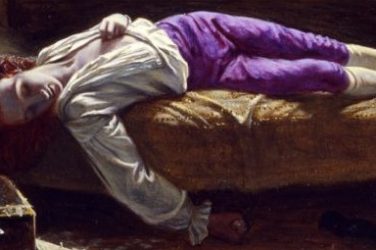E&M‘s Fernando Hortal Foronda explores how history can be (re)told and challenged on screen and analyses how TV series across Europe engage with nationalist narratives.
Films and TV series offer an alternative view of the world. Whether fully fictional or ‘based on a true story’, they provide getaways from reality in a way historical or factual accounts of events cannot.
Cultural productions do not necessarily inform us any better about an event, an issue, or a topic than historical or scientific reports do; but they allow us to approach them from a different perspective and empathise with those that are different from us. In other words, TV and film shape our perception and imagination of reality, potentially enhancing our understanding of and solidarity with ‘the Other’ – whoever ‘the Other’ may be.
Particularly when historical events, social realities or experiences are censored and marginalised in official accounts, (mass) cultural productions can directly or indirectly enhance our knowledge of the past and the present. TV series, for example, have been studied to affect the attitudes towards phenomena as diverse as homosexuality and terrorism, and even the understanding of how others perceive us.
TV series are a vehicle to challenge nationalist discourse. On screen, nations’ grand histories can be questioned, recast and, thereby, subverted.

TV series and movies have played a demonstrated role in raising awareness of and (re)defining collective notions of historical traumatic events. As the researcher Cecilie Felicia Stokholm Banke explains, while the impact of the Eichmann trial in Jerusalem in 1961 as well as events such as Brandt’s Warsaw kneeling and the murder of Israeli athletes in the 1972 Munich Olympics can hardly be overestimated, TV series did play an equally crucial role in changing the practices and policies of Holocaust memory. When the television series Holocaust: The Story of the Family Weiss reached an audience of 220 million in 1978, it confronted the viewers with an intimate account of the experience of victims and survivors of the Shoah, pushing the audience to recognise the reality and dimension of the Holocaust.
Beyond offering an avenue to elicit empathy for and understanding of the marginalised, TV and film can help to challenge those in power. Benedict Anderson argued that a paradox of nationalism is that its strong political influence exists alongside theoretical weaknesses, incoherent narratives, and historical inaccuracies. These inconsistencies, however, are ignored in favour of an ostensibly grand and flawless national narrative. If this is the case, in a Europe where nationalism is resurgent, TV series are a vehicle to challenge nationalist discourse. On screen, nations’ grand histories can be questioned, recast and, thereby, subverted.
Retelling Danish history in 1864
A remarkable example of the political and social potential of TV shows is illustrated by Denmark’s reception of the show 1864. Commissioned by the Liberal-Conservative Danish government – in what was criticised by some as political instrumentalisation of the state-owned broadcaster and an extravagant waste of resources, the show can be thought to have been originally conceived for the purpose of celebrating a nationalist understanding of Denmark. However, the writer and director Ole Bornedal characterises D. V. Monrad – the main political figure on the Danish right in the mid to late 1800s – as an incapable lunatic whose madness is almost single-handedly responsible for the decline of Denmark and the death of many young Danes. The show also draws parallels between conflicting notions of Denmark and Danishness in 1864 and today, unequivocally vindicating a sceptical stance on Danish nationalism and the diverse character of Danish society. The airing of the show led to an intense and broad public debate on many levels. Underneath the public debate on the accuracy of the show, one could see another debate on defining how Denmark should be understood and even celebrated today, particularly relating to the growing multicultural character of the country. In the guise of spectacular scenes of 19th century warfare, the show’s messages reached a wide audience; 1864’s historical ‘package’ made its modern-day themes palatable even for those, who might not have engaged with them otherwise.
French bureaucrats and British Traitors

Finally, two recent productions, one French and one British, challenge the imagination of the nation and the empire. Au Service de la France (A Very Secret Service), provides a fictional – and comedic – account of the French secret service during the Cold War. Shot between 2015-2018 and set on the eve of the Algerian War of Independence and the overall decline of French colonialism, Au Service is more than just a parody of (French) bureaucracy. Episode after episode, the viewer experiences the tension and ambivalence between comedy and truth. The series can be understood not as parody of reality, but as an attempt to portray reality through parody. Umberto Eco noted in his analysis of Casablanca that ‘(T)wo clichés make us laugh. A hundred clichés move us.’
Two clichés on the inefficiency of the French administration make us laugh, a hundred clichés combined with caricatures, exaggerations and puns might be the best way to depict an uncomfortable reality. And Au Service de la France’s reality is in conflict with the national myth of grandeur, resistance, and even a mission civilisatrice. During the first minutes of the show, its protagonist is interrogated by his future boss in the secret service. The interrogation serves the purpose of defining France as the cradle of civilization, democracy and progress. However, the rest of the series shatters any mythical notion of France, challenging the audience’s perception of the République.
The series can be understood not as parody of reality, but as an attempt to portray reality through parody.
If its use of parody to revisit and reimagine the imperial and national past is Au Service’s main virtue, the UK’s Traitors main virtue might be what it is not. In the crowded and ever-growing field of audio-visual content based on the UK’s participation in World War II, such as The King’s Speech, Darkest Hour, and Dunkirk, Traitors succeeds at telling a completely different story that deals with the same series of events.
Traitors is a window into Britain in the early 40s as experienced by a black American man working as a chauffeur for an army official, a young Tory woman, and a war veteran MP, whose experience on the front made him a determined pacifist. This is notably not the Britain of Winston Churchill, of King George VI, or of brave soldiers on the battlefield. Instead of a blind reproduction of presumed nationalist heroism, Traitors is an invitation to rethink what it means to be a traitor and to contemplate when treason indeed becomes a moral duty.
1864, Au Service de la France, and Traitors will not decisively change the national self-understanding of Danes, the French and the Britons. Placing such big expectations on three TV shows would only lead to disappointment for anyone hoping they will inspire grand social and political revolution. However, these series chip away at their countries’ nationalist narratives, offering alternatives to uncritical and one-sided accounts of history and the present.
Cover Photo: Jeremy Yap (Unsplash), Unsplash Licence










